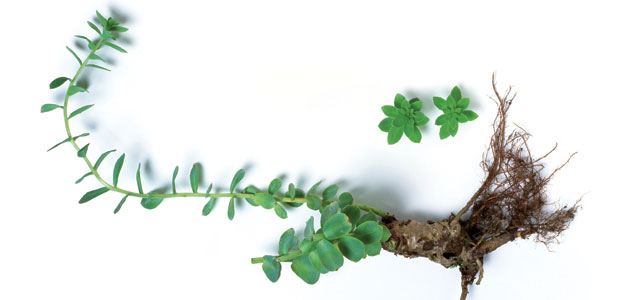Advertisement
Remember Rhodiola
Actic root comes in from the cold

A herb that was widely used by ancient Nordic seafarers is still being used by monks of the Himalayas. The therapeutic properties of this Arctic herb, rhodiola (Rhodiola rosea), have also been impressing modern researchers.
Rhodiola root’s unique adaptogenic action has led to its widespread use in northern regions, where it thrives. Modern research has affirmed the root’s safety and effectiveness.
Rhodiola has proven to be particularly beneficial when used to improve memory, decrease fatigue, treat mild to moderate depression, and enhance athletic performance. Studies have also shown that rhodiola root protects the cardiovascular system from stress.
Rhodiola has a long history of use as a traditional medicine in Northern Europe and Asia. After discovering rhodiola in Iceland, the Vikings used the root to give them extra strength during their long and physically challenging journeys at sea; they even had a saying: “The man who uses [this root] will stay powerful for 200 years.”
Adapting to Stressors
The herb’s ability to treat depression, enhance learning and memory, and increase the body’s ability to adapt to emotional and physical stress seems ideally suited to the needs of an increasing population of overtaxed and overstressed Canadians.
Research has shown that rhodiola’s restorative action is due to its positive influence on biogenic neurotransmitters, including norepinephrine, dopamine, serotonin, and acetylcholine.
When taken internally, rhodiola inhibits the breakdown of these important brain chemicals and increases their bioavailability, resulting in a greater sense of well-being and enabling the body to better adapt when stress occurs.
Herbs that work in this way are appropriately called adaptogens and include American ginseng, Korean ginseng, and eleuthero root. Rhodiola root possesses the ability to prevent the damaging effects of stress even in acute situations.
This protective action is particularly important for athletes. Rhodiola root extract, taken just before a marathon run or prior to a cycling competition, may help in the recovery from the physical demands made on the body.
Rhodiola Research
Cardiovascular Stress
Researchers have found that the extract protects the cardiovascular tissue against stress-induced damage and helps to stabilize the heartbeat, thereby decreasing arrhythmias, indicating rhodiola’s use as a cardiovascular tonic.
Memory, Fatigue, Motivation
In one study that tested mental performance and fatigue in a group of 56 healthy night-duty physicians, the group that was given rhodiola extract demonstrated significant improvement in fatigue index scores compared to the placebo group.
In another study, 40 medical students were given either rhodiola extract or a placebo during exams. The students who received the rhodiola demonstrated significant improvements in mental performance, physical fitness, improved sleep, and interestingly, a greater motivation to study.
Anxiety and Depression
In a large study published in the Nordic Journal of Psychiatry, researchers found that rhodiola demonstrated antidepressant activity in patients diagnosed with mild to moderate depression. Patients who were given up to 680 mg of a standardized rhodiola extract twice per day experienced marked improvements in insomnia, emotional instability, and anxiety scores compared to those given a placebo.
Choosing Rhodiola
Several naturally occurring compounds which are unique to the Rhodiola rosea species include rosavin, rosin, rosarin, rosiridin, and salidroside. These compounds are accepted as the chemical markers which should be present to identify the correct rhodiola species. Most studies have used extracts standardized to contain a minimum of 3 percent rosavins and up to 1 percent salidroside, as this is the natural ratio in the root.
Though rhodiola may not make you powerful for 200 years, as the Vikings might have wished they were, it can certainly help improve your mental and cardiovascular vigour.
Dosage
- Dried root: 1 tsp (5 mL), three times per day
- Capsules: 200 to 600 mg daily standardized to contain 3 percent rosavins and 1 percent salidroside
- Tincture: 5 mL, 2 to 3 times daily




